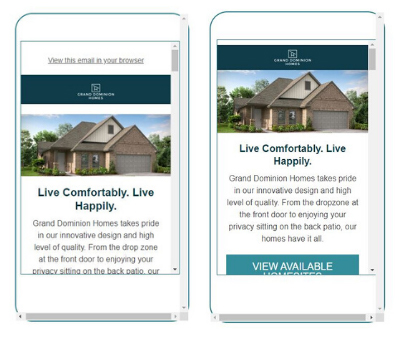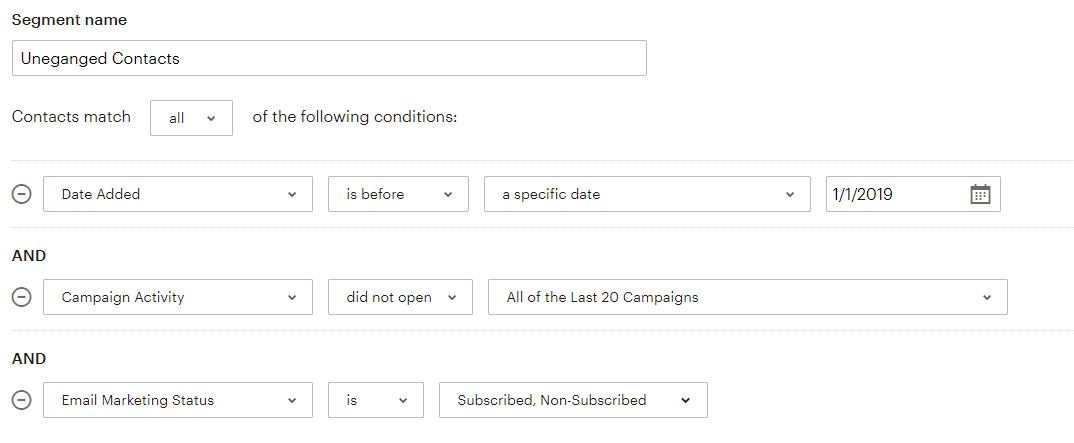7 Email Best Practices to STOP in 2020January 23, 2020Everyone loves email best practices! It makes sending perfect email campaigns a formulaic experience guaranteed to give you great open rates, excellent CTR, and (woot woot) all the ROI! Unfortunately, the party is a little premature. The email world is changing, and things that marketers (us included) have always considered to be a best practice may be coming into question. Take a look and see which email best practices you should test ditching in 2020.
1. STOP: “View in Browser” LinkAnyone who sends HTML emails will tell you: getting emails to be cross-browser beautiful is challenging. Hence, email marketers have diligently included the very thoughtful “View this email in your browser” link in the header. The user simply clicks out of the email client and then is shown a lovely, perfectly rendered HTML email. Try ditching it. We reviewed several email campaigns from the last year, and the overall click volume to the “View in Browser” link was negligible, borderline non-existent. (Those clicks were PROBABLY us, getting a preview link to share with our clients.) Aside from its unpopularity, “View in Browser” takes valuable above-the-fold real estate on your mobile device. By removing this, we allow for more valuable content to be seen from the moment the email opens up on mobile.
2. STOP: Putting the CTA at the Bottom of the EmailThis one is a little misleading. Please add CTAs to the bottom of every email, but also add them above the fold on mobile. In this example, the highly visible CTA is above the fold, giving the recipient a chance to interact with your email quickly. This perfect parcel of messaging is packaged on-screen, getting to the point quickly for us with goldfish memories and the attention spans of dogs chasing more than one squirrel. Test doing CTAs in both placements - at the bottom AND the top - to see if you get an increase on email click-throughs and conversions in 2020.
3. STOP: One-Click UnsubscribeStop making it easy for your email list subscribers to unsubscribe. Instead, use your unsubscribe page as an opportunity to invite them to stay. 21% of people report that they unsubscribe when they feel like the information is not relevant. This is fine - how can you help them opt into segments that allow for them to self-curate and self-identify their interests? In the homebuilding and developer world, we imagine that subscription in Mailchimp, HubSpot, or similar could easily be:
Don’t let your hard-earned lead leave you with a single click. Let your unsubscribe link take them to a subscription page instead. A witty “why are you leaving us?!” message would be good too.
4. STOP: Skipping Email PersonalizationTOO MUCH personalization is creepy and stalker-ish. There are only so many times you want to see your first name in your inbox. However, personalization done correctly to the tune of...
...can increase your email’s relevance. Real-time human automation can allow you to, for example, send an email to a prospect to invite them to come and visit model homes, who recently viewed a series of homes. This action provides value and an important next-step touch point.
5. STOP: Dual Opt-InThere’s nothing like giving a website my email address and then receiving a confirmation email that says something like, “Thanks for signing up for email! Would you like more emails?” 🤔 (This is our dual opt-in face) Many marketers argue that dual opt-in is required for GDPR Compliance, although we strongly recommend you speak to your legal counsel. Another common interpretation of GDPR is that you must simply PROVE that your subscribers opted in (easily handled by including a checkbox: “Sign me up for your email list.”) For those of us marketing in the USA, there is no reason to force dual opt-in as long as you include the required unsubscribe text in the email footer. You’re welcome.
6. STOP: List PurgingLiterally last year, we were shown data that said that you could improve deliverability rates by removing “unengaged users” from your email list. This is still a best practice. But the cadence that many other marketers were adopting were a little… soon. Blue Sky Marketing’s best practice is to purge unengaged users after 12 months of inactivity. That means one year of never opening an email. In Mailchimp, the filters look similar to: At a recent digital conference, we learned that some marketers were doing purges every three months, statistically showing that they were improving deliverability and open rates… because that’s how statistics work. If you decrease the population size, then open rates will increase. #math It is important to measure how many net eyeballs, or total unique opens, your emails are getting. Don’t purge for the sake of improving open rates - even if your open rates fall, statistically, you are quantifiably receiving more net opens per email. If your deliverability is actively suffering, test purging the list once a year. Or, if you have an email marketing platform that does not automatically remove or archive unsubscribed leads, test purging after a certain set time of complete inactivity.
7. STOP: A/B Testing Because You Just Want to A/B TestThe thing about A/B testing is that once you find something that works, stop testing for a bit! There is no need to A/B test every subject line, or every creative, or every CTA for the sake of testing. If you are not able to measure quantifiable and meaningful results from an A/B test, you’re not doing it right. For example, if you discover via A/B test that putting your CTA button above the fold gives you 35% more clicks, then why do you need to A/B test it again? You’ve found a way to save time AND be more effective in your email marketing. A/B tests, in short, should only be conducted if you are trying to make a meaningful discovery that can lead to implementation for similar campaigns.
Email Marketing 2020Email marketing remains an important medium to generate ROI. Your leads have basically told you, “Hey! I trust you enough to give you my personal email. Tell me more. Let me stay involved with you.” Which email best practices will YOU test stopping in 2020?
We Can Help - Reach Out Today!If you’re curious about expanding your email marketing program, email us. Call Michelle at 713.818.0070. Or fill out a contact us form and we will call you. Talk soon.
|
Explore our Blog
Sign up for email updates!
The Archives
- NOVEMBER 2025 (1)
- FEBRUARY 2022 (2)
- JANUARY 2022 (2)
- DECEMBER 2021 (2)
- NOVEMBER 2021 (2)
- OCTOBER 2021 (1)
- SEPTEMBER 2021 (2)
- AUGUST 2021 (2)
- JULY 2021 (3)
- JUNE 2021 (2)
- APRIL 2021 (1)
- MARCH 2021 (3)
- FEBRUARY 2021 (2)
- DECEMBER 2020 (2)
- OCTOBER 2020 (1)
- SEPTEMBER 2020 (1)
- AUGUST 2020 (5)
- JULY 2020 (1)
- JUNE 2020 (1)
- MAY 2020 (2)
- APRIL 2020 (1)
- JANUARY 2020 (1)
- OCTOBER 2019 (1)
- SEPTEMBER 2019 (2)
- AUGUST 2019 (1)
- JULY 2019 (4)
- JUNE 2019 (2)
- MAY 2019 (1)
- MARCH 2019 (1)
- JANUARY 2019 (1)
- SEPTEMBER 2018 (1)
- AUGUST 2018 (1)
- MAY 2018 (1)
- DECEMBER 2017 (1)
- NOVEMBER 2017 (3)
- OCTOBER 2017 (1)
- AUGUST 2017 (5)
- JUNE 2017 (1)
- MAY 2017 (1)
- FEBRUARY 2017 (2)
- NOVEMBER 2016 (3)
- OCTOBER 2016 (6)
- SEPTEMBER 2016 (1)
- JULY 2016 (4)
- JUNE 2016 (3)
- APRIL 2016 (3)
- MARCH 2016 (1)
- JANUARY 2016 (1)
- NOVEMBER 2015 (1)
- AUGUST 2015 (1)
- JULY 2015 (3)
- JUNE 2015 (4)
- MAY 2015 (2)
- DECEMBER 2014 (1)
- OCTOBER 2014 (1)
- AUGUST 2014 (1)
- JULY 2014 (2)
- JUNE 2014 (1)
- MARCH 2014 (2)
- FEBRUARY 2014 (3)
- NOVEMBER 2013 (2)
- SEPTEMBER 2013 (4)
- AUGUST 2013 (2)
- JULY 2013 (1)
- JUNE 2013 (1)
- MAY 2013 (2)
- APRIL 2013 (3)
- MARCH 2013 (3)
- FEBRUARY 2013 (3)
- JANUARY 2013 (5)
- DECEMBER 2012 (4)
- NOVEMBER 2012 (2)
- OCTOBER 2012 (3)
- AUGUST 2012 (1)
- JULY 2012 (2)
- JUNE 2012 (1)
- MAY 2012 (3)
- APRIL 2012 (1)
- MARCH 2012 (2)
- JANUARY 2012 (1)
- OCTOBER 2011 (3)
- JULY 2011 (3)
- MAY 2011 (2)
- APRIL 2011 (2)
- MARCH 2011 (1)
- FEBRUARY 2011 (1)
- JANUARY 2011 (2)
- DECEMBER 2010 (1)
- NOVEMBER 2010 (2)
- OCTOBER 2010 (9)
- SEPTEMBER 2010 (13)
- AUGUST 2010 (29)









